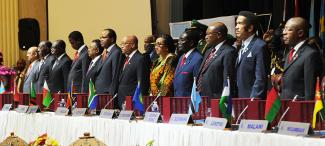Over the course of the last fifty years, the nature of Africa’s illicit financial flows have gradually evolved, becoming more complex as centralized public sector corruption has transformed into decentralized private sector corruption.

The leak of 11 million documents from the highly secretive Panamanian law firm, Mossack Fonseca, (referred to as the Panama Papers) has shone the spotlight on the offshore holdings and illicit financial flows (IFFs) of 128 current and former political leaders and officials, as well as criminals, terrorist organizations, corporations, billionaires‚ and celebrities.
From Panama to Africa
Illicit flows are defined as “Money that is illegally earned, transferred, or utilized.” The evidence suggests that during the past 50 years, African countries have lost about $1 trillion which equates to around $50 billion annually. This total amount is equivalent to all of the official development assistance received by Africa over the same time frame and is enough to wipe out the region’s total external debt of around $250 billion and still leave $600 billion for poverty alleviation and economic growth.
Components of IFFs
While the regulatory implications of the Panama Papers are still gaining traction, Oxfam's Senior Tax Policy Advisor Tatu Ilunga and Transparency International's Senior Policy Coordinator Craig Fagan argue that the leaked documents highlight the need for an overhaul of the global tax system. In Africa, the effect of the illicit financial flows (IFFs) are so detrimental that in July 2015, at the United Nations Financing for Development conference in Addis Ababa, African nations offered to forego international aid in exchange for western countries agreeing to close tax loopholes and shut down tax havens.
IFFs typically arise from corruption, illegal exploitation, and tax evasion. Thus illicit outflows are primarily a governance problem, arising from weak institutions and inadequate regulatory infrastructure. These include limited access to legal and financial expertise, misaligned domestic tax and trade reporting policies with global requirements, outdated information gathering and sharing mechanisms, and a lack of political will. Calculating the proportion of IFFs that comprise corruption is difficult but has been estimated at around 5% of global IFFs, although some believe that for Africa this may be much higher as this figure does not include the role of corrupt practises in facilitating other forms of IFFs.
As shown by the Panama Papers, Mossack Fonseca helped clients launder money‚ dodge sanctions and evade tax using an array of mechanisms, but particularly abusive transfer pricing (which entails using shell companies to move profits to low-tax or no-tax countries without leaving a paper trail) and trade mis-invoicing (which entails under- or over-stating the price, quality or quantity of traded goods and services). Over the last ten years, African countries have lost between $242 billion and $407 billion from trade mis-invoicing alone, but mispricing in total comprises between 60% and 80% of IFFs while around 35% arises from criminal activity. Thus these statistics show that commercial activities are the largest component of IFFs, followed by organized crime, and then public sector corruption.
Conclusion
Over the course of the last fifty years, the nature of Africa’s IFFs has gradually evolved, becoming more complex as centralised public sector corruption transformed into decentralised private sector corruption. This change in the nature of IFFs reflects Africa’s developmental progress away from donor reliance to trade-led economic growth. African officials no longer primarily siphon off aid into foreign accounts but instead act as intermediaries and gatekeepers between access to resources and markets on the one side, and mostly private sector companies on the other. Hence, closing tax havens and loopholes will significantly benefit Africa’s economies, but there is also a need to deepen the anti-corruption and regulatory institutions in order to limit the capability of corrupt leaders and officials, and strengthen Africa’s democracies by entrenching transparency and accountability.
This article was first published in The Conversation.

